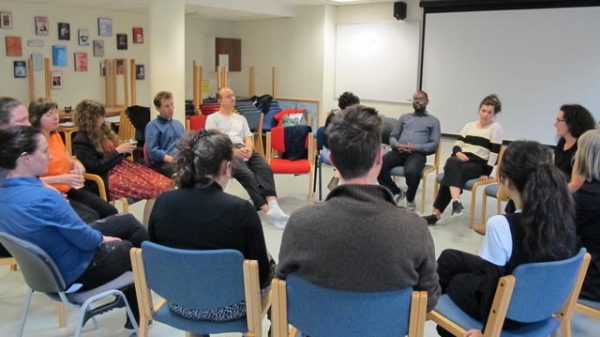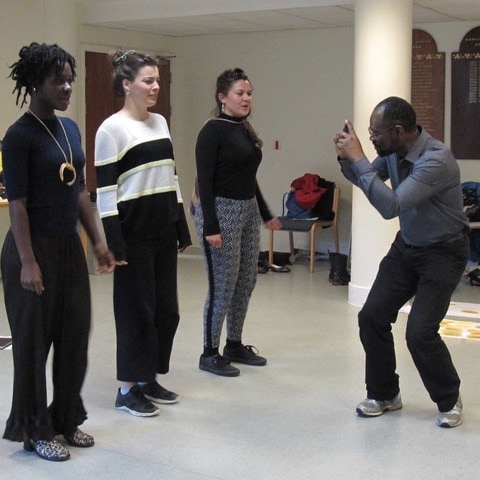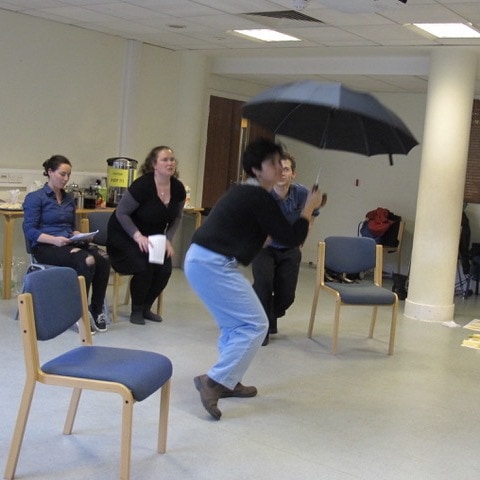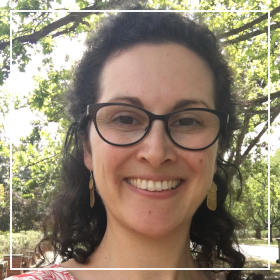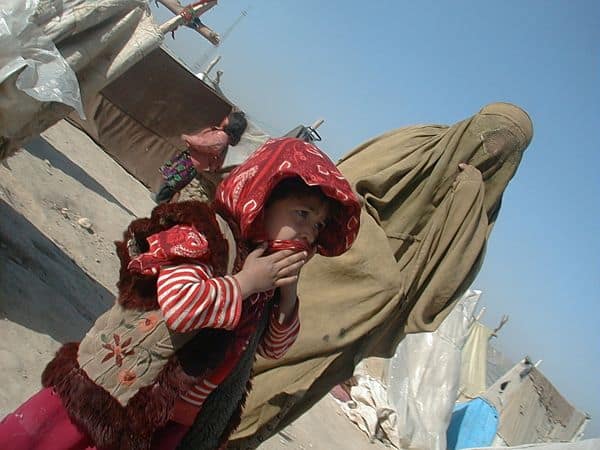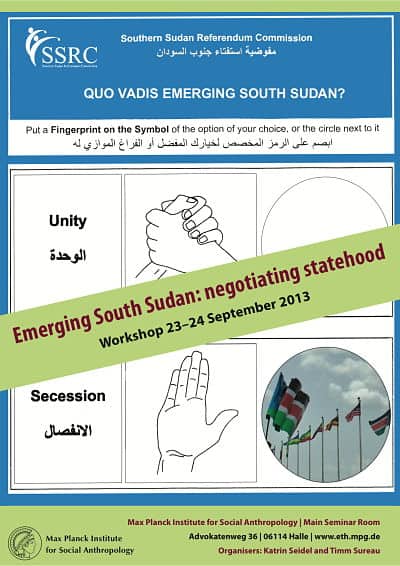You would have been forgiven for doing a double take if you walked past UCL Anthropology’s Darryl Forde Seminar Room on Monday 10 June, 2019. Breaking with established seminar culture—orderly rows of chairs, focused audience trained on a lone speaker—a cacophony of squawks, mews and hisses issued from a menagerie.
16 workshop participants crawled, flew or slithered to rhythmic music accompanying facial expressions from the sombre to the absurd.
Graduate students and academics from UCL, Oxford, LSE, Exeter, Kent, Canterbury, Queen Mary, Royal College of Art, Cambridge, Goldsmiths and the University of Jyväskylä (Finland) were taking part in a performance ethnography workshop I organised in association with my reading group “Political and Moral Economies of Voluntarism”, led by theatre practitioner Tom Bailey of Mechanimal Theatre Company. The workshop was oriented at an introductory level for anthropologists to allow exploration with theatre techniques and collaborative methods, guided by an experienced theatre practitioner.
The idea was conceived after I saw the panel “Anthropology and the Matter of Whiteness” at the 2017 American Anthropological Association Conference. Panelists riffed interactive, intertwined narratives back and forth in a style reminiscent of spoken-word. Watching this lively, collaborative performance was a radical change from the other panels I attended. The standard presentation formula seemed to flatten dynamic, nuanced ethnography. It could also potentially be alienating for non-anthropologists. Could experimental and collaborative performances such as these mitigate the flattening effect, and provide a channel for anthropological public engagement?
Inspired, along with fellow UCL PhD students Victoria Tecca, Sabine de Graaf and Ioanna Manoussaki-Adamopoulou and discussant Ruth Mandel, we experimented at the 2018 Association for the Anthropology of Social Change and Development Conference in our panel “Humanitarianism/s within and outside the state: A collaborative ethnographic story.”
We spliced fieldsites in Australia, Greece and France into one single “script” performed together. Playing characters in other fieldsites, we learned about the intention and emotion of one another’s research participants, engaging deeply with each other’s work.
As this Allegra Lab thread attests, performance is a topic of increasing interest within anthropology. There is already a rich tradition of considering the relationship between performance and anthropology at UCL, with a reading group and research lab founded by Martin Holbraad and others such as Kelly Robinson and Dan Sherer. Interest and expertise was clear in the level of experience people brought to the workshop: many had performed auto-ethnographic plays, co-produced plays with research participants, and used audio-visual techniques. Participant Sinibaldo De Rosa (Exeter) shared that since the 1980s, performance ethnography became an established field at the intersection of anthropology and performance studies after figures such as Johannes Fabian, Dwight Conquergood, and Soyini Madison drew attention to the self-reflective, intersubjective and embodied learning processes at work in the construction of ethnographic knowledge. As a theory, method and critical cultural praxis, performance ethnography opened avenues to challenge engrained understandings of knowledge production.
We observed how performance informed a new way of co-producing knowledge over the course of the workshop. Tom Bailey introduced us to theatrical skills such as storytelling through scene-setting, emotion, gesture, humour, and surprise; ensemble work, speaking as a “Greek chorus”; character, impersonating an animal and enacting its personality; improvisation; and physical techniques such as flocking (moving as a pack), mirroring, and balancing space.
We then applied these skills to our own “fieldwork script” based off dialogue, a vignette or scenario. Participants combined their scripts with others in a collaborative performance for an informal showcase. This led to hybrid yet surprisingly coherent scenes, covering diverse topics: the anthropologist’s gaze, the burial of a migrant who died at sea, live action gaming role-play juxtaposed with oral history war narratives, luck-giving rituals and learning how to drive an automated car, the right way to cook a pig stew and the provision of humanitarian aid. Each performance involved intensive group work and highlighted different techniques learned, such as soundscapes, narrative, physicality, gesture and objects.
The final group discussion brought the focus back to anthropology. What did performance ethnography add to the discipline? Did the attempt to re-enact dialogue or elements of research participants’ identities raise new questions around the politics of representation?
Olivia Barnett-Naghshineh (Goldsmiths) noted that a key strength of performing ethnography was the creation of a narrative that was easy to follow and relatable for the audience, which could have a humanising and equalising effect. Aleena Chia (University of Jyväskylä) cautioned that sometimes this format could simplify a narrative to the detriment of the ethnographic complexity anthropologists strive to retain, but also introduced new possibilities in an “economy of attention,” foregrounding parts of ethnography that were not easy to convey through text such as silences, non-dialogic communication, or material objects. Valentina Zagaria (LSE) spoke of the immediacy of public response she received performing ethnographic political street theatre, and how it strengthened ethical engagement through a real-time feedback loop from her research participants. The anthropological responsibility not to reinforce stereotypes by boiling research participants down to caricatures was also raised as an important point to consider.
Many wanted to see another workshop organised, and the development of a collaborative network of performance anthropologists. The utility of performance ethnography as a pedagogical tool was also raised, with some suggesting it could be useful for teaching undergraduate students or part of a research curriculum for graduate students.
What this workshop drove home to me was that performance ethnography can be a means of changing anthropological knowledge production to be more collaborative and reflexive, involving a process of working on—and thinking through—our ethnography together. It can also involve a broad range of people in this process, adding to its effectiveness as a form of public engagement. The affective, relational and collaborative qualities of performance ethnography can foreground subaltern voices, present sensitive topics in broadly relatable ways, and allow for co-production with research participants.
Performance ethnography can also potentially make anthropology more politically engaged. As Alex Flynn and Jonas Tinius note (2015, 3), political performances move people—they cause them to reflect, and interact with the world in a different manner. Through performance ethnography, we can perhaps communicate anthropological accounts and showcase alternative ways of living and being in the world, in an accessible way that resonates with a wider audience.
References
Flynn, Alex and Tinius, Jonas (Eds.). 2015. Anthropology, Theatre and Development: The Transformative Potential of Performance. London: Palgrave Macmillan.
Feature image by PIRO4D (Courtesy of Pixabay)


